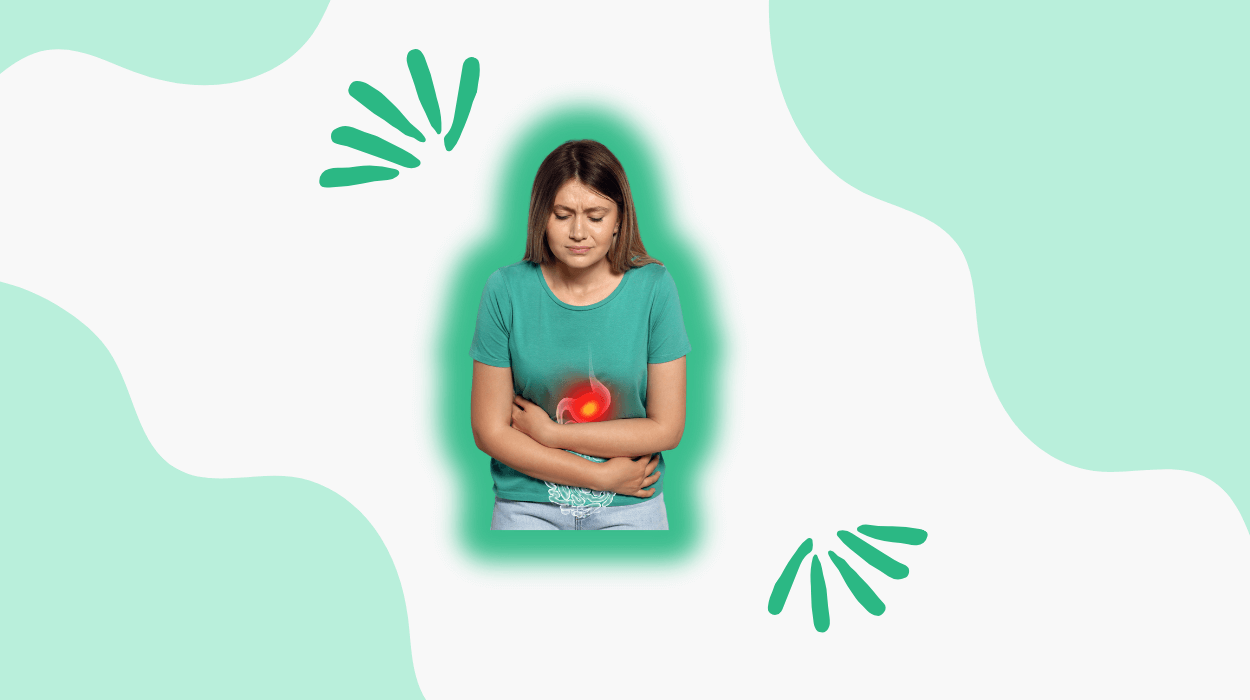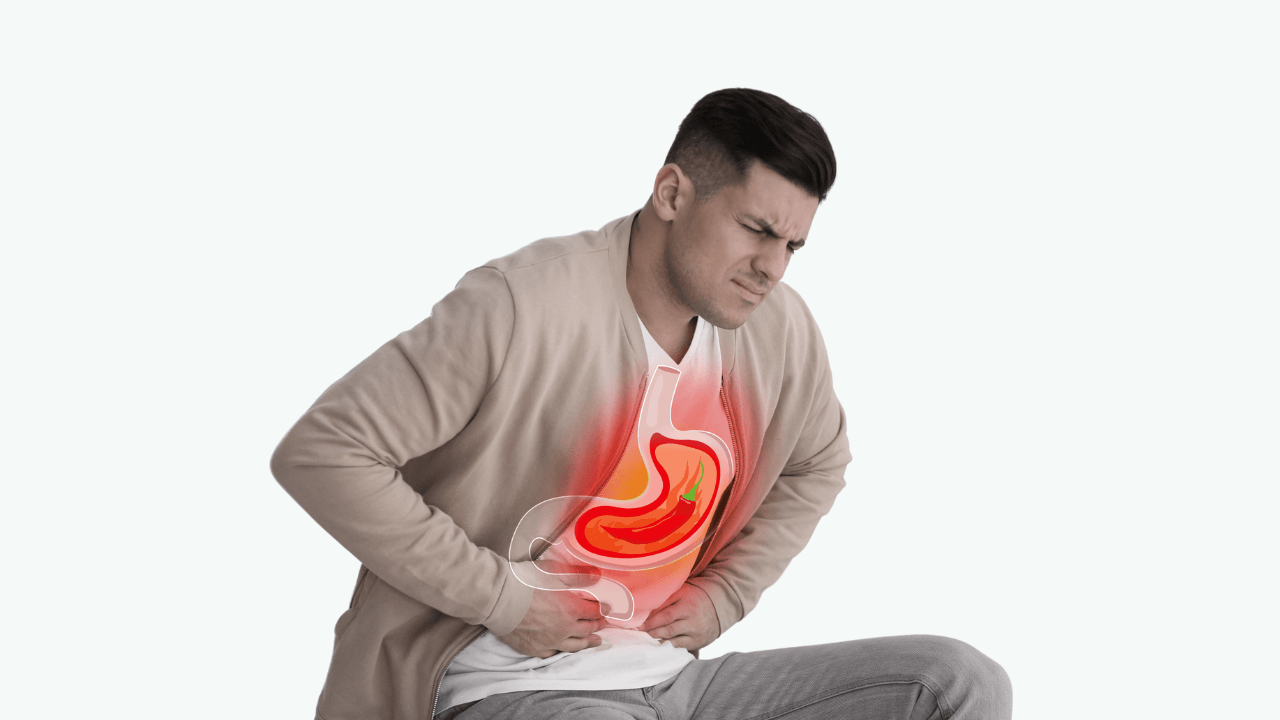

Your favorite food treats your taste buds, and you love devouring it. However, sometimes, consuming food without proper chewing or eating in excess might cause dyspepsia.
Stomach burning could cause discomfort or a painful sensation in the upper abdomen. It could disrupt your comfort and may have an adverse effect on your digestive health.
Stomach discomfort could be due to indigestion or food sensitivity. It could also be accompanied by nausea, bloating, and gas.
Indigestion could be a symptom of acid reflux, ulcer, gastritis, or other gastrointestinal problems. However, persistent stomach burning could indicate an underlying health concern.
Understanding your triggers and finding the root cause may help you alleviate the stomach burning. Some simple home remedies may calm the stomach’s burning sensations.

Gastroesophageal Reflux is a chronic condition that causes frequent acid reflux, where stomach acid rises into the esophagus, leading to burning in the stomach and chest.
People with GERD may experience difficulty swallowing, a sour taste in the mouth, chronic cough, and gas and bloating. GERD could lead to complications if left untreated.
The persistent exposure of the esophagus to stomach acid could cause erosion and inflammation. It might lead to conditions such as Barrett’s esophagus, which includes potentially harmful changes in the esophageal lining.
Treatment for GERD typically requires a combination of lifestyle modifications and medications. Lifestyle changes may include avoiding trigger foods, eating smaller, more frequent meals, maintaining a healthy weight, and managing stress levels.
Medications such as antacids, alginate antacids, H2 blockers, and proton pump inhibitors can reduce the production of stomach acid and alleviate symptoms.
Irritable Bowel Syndrome is a gastrointestinal concern that affects approximately 10-15% of the population. The exact cause of IBS is unknown, but it could be a combination of factors, including abnormalities in the gut-brain axis, changes in gut motility, and heightened sensitivity to pain.
People with IBS may experience stomach burning, cramps, bloating, gas, constipation, and diarrhea. Tools such as ultrasounds or endoscopy may be used, and tests like a breath test for H. pylori may be conducted to rule out other possible causes of IBS.
Functional dyspepsia, or non-ulcer dyspepsia, is a digestive disorder that may cause pain or a burning feeling in the upper abdomen and a sensation of fullness without any identifiable cause. It is also called irritable stomach syndrome, which causes a sensation of fullness and upper abdominal pain. Functional dyspepsia is a recurring dyspepsia that might occur for more than 3 months in a 6-month duration.
Peptic ulcers are painful sores on the stomach lining or the above part of the small intestine. These ulcers can cause a burning pain in the stomach and abdomen, as well as a feeling of fullness, bloating, burping, heartburn, and nausea. Many people with peptic ulcers could also experience reactions to certain foods, with spicy foods often making symptoms worse.
Helicobacter pylori can cause a bacterial infection in the stomach, leading to symptoms including stomach burning, bloating, burping, loss of appetite, unexpected weight loss, and nausea.
However, stomach infections caused by H. pylori can be diagnosed through various methods, including physical exams, questioning about symptoms and medical history, and specific tests such as a breath test.
Indigestion or dyspepsia could cause stomach burning, bloating, gas, heartburn, feeling full, and nausea. It is often caused by factors such as overeating, consuming spicy or acidic foods, food intolerances or allergies, stress, and certain medications.
Here are some specific symptoms of acid reflux, a common cause of stomach burning, which may include:
Apple cider vinegar helps neutralize excessive stomach acid, providing relief from the burning pain through its acidic nature. It may assist in digestion by stimulating the growth of digestive enzymes and promoting the breakdown of food. ACV could help alleviate symptoms such as bloating, gas, and abdominal pain.
You can combine apple cider vinegar in your routine by mixing one tablespoon of vinegar in one glass of water.
Acidic foods have a low pH level and are highly acidic, which might cause discomfort and burning sensations in the stomach. These foods include:
When you consume acidic foods, they could trigger the growth of excess stomach acid, leading to symptoms such as heartburn, indigestion, and bloating.
Thus, maintaining a healthy diet that includes a variety of non-acidic, alkaline foods could help you prevent stomach discomfort. Quinoa, amaranth, or millet may assist in balancing the pH levels in the body and promote better digestion.
Probiotics are known as live bacteria that are beneficial for your digestive function. They could help balance the bacteria in your gut, leading to a decrease in stomach acid production.
Studies have shown that probiotics could be an effective way to treat acid reflux. Probiotics could strengthen your digestive system and reduce inflammation by promoting healthy bacteria in your gut. It might lead to a decrease in heartburn and indigestion.
Chamomile contains compounds that possess anti-inflammatory properties, which can help soothe the inflamed stomach lining that may be causing the burning sensation. It also has stress-relieving properties, which could help reduce stress levels, promoting relaxation and calming the nerves.
Chamomile tea may assist in digestion by relaxing the muscles in the digestive tract and facilitating the movement of food through the system. It may promote healthy digestion and can reduce the likelihood of experiencing stomach burning.
Ginger contains compounds called gingerols, which have anti-inflammatory effects on the stomach lining. It might help reduce inflammation and discomfort caused by excess stomach acid.
Ginger supports the production of digestive enzymes, which could help improve digestion and prevent the buildup of stomach acid. It might help relax the muscles of the gastrointestinal tract, promoting smooth digestion and reducing the chances of acid reflux.
Consuming large meals produces more acid in the stomach to break the food, leading to indigestion and acid reflux. You can avoid overloading your stomach and keep acid levels in check by eating smaller meals more often. Eating frequent and smaller meals could help improve metabolism and maintain energy levels.
| Advantages of Consuming Smaller Meals | Disadvantages of Consuming Larger Meals |
|---|---|
| Reduces stomach acid | Increases stomach acid |
| Improves digestion | Slows down digestion |
| Avoids overloading the stomach | Overloads the stomach |
| Maintains energy levels throughout the day | Causes energy crashes |
| Helps in weight management | Promotes weight gain |
Must See: How To Remove Gas From The Stomach Instantly? [11 Home Remedies]
If you are dealing with persistent symptoms of stomach burning, it is essential to seek medical support to determine the underlying cause and receive appropriate treatment.
However, a single episode of indigestion may not be cause for concern, but persistent symptoms that last for a long time or recur throughout the day should not be ignored.
If you experience other symptoms like unexplained weight loss, feelings of fullness, or a loss of appetite, along with stomach burning, you must speak with a medical expert.
Seeking medical attention is crucial because persistent stomach burning can be a sign of underlying conditions that require treatment. These conditions may include gastroesophageal reflux disease (GERD), stomach ulcers, gastritis, or even stomach cancer.
Stomach burning can cause discomfort and hinder your daily activities. It might make you lose your appetite and nausea due to the constant feeling of burning after or before eating.
You could significantly decrease the frequency and intensity of these painful episodes by utilizing immediate relief strategies, executing lifestyle changes, and identifying your triggers.
Baking soda, apple cider vinegar, and peppermint could provide comfort from indigestion by reducing stomach acidity naturally.
Maintaining a food journal might help identify specific foods that worsen symptoms. Eating smaller, more frequent meals and practicing stress management techniques can also soothe stomach discomfort.
If you experience persistent and severe heartburn, it is better to consult with a Gastroenterologist to understand the cause and seek proper medication.
Tyler Read earned an undergraduate academic degree from Sonoma State University, California and is a certified personal trainer (CPT) with NASM (National Academy of Sports Medicine). With over 16 years of experience, Tyler has trained clients both online and in-person.
He is passionate about helping others turn their love for fitness into a career. Tyler has worked with many local and commercial gyms before establishing his successful private personal training business, which he continues to operate.
